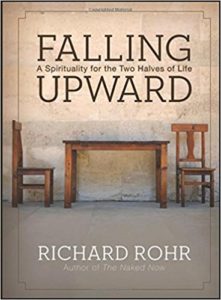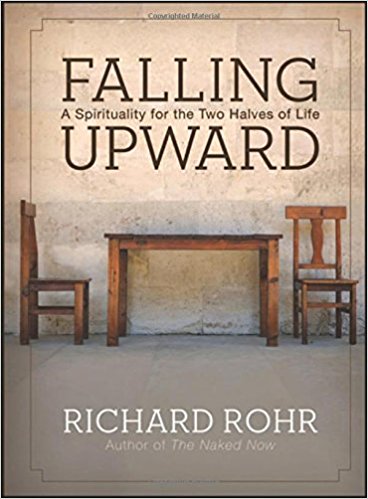 The four people on this three-part podcast episode love Richard Rohr’s book, Falling Upward: A Spirituality for the Two Halves of Life. If you find yourself experiencing a faith crisis or in some way are actively feeling called to reexamine and make peace with or in some way better integrate within your heart and mind life’s deepest and most unsolvable (thankfully!) questions and your personal experiences (wonderful and tragic) in deep, soulful ways in which you can come to most meaningfully embrace your truest self and life in all its beautiful (and tragic) mystery, please listen. Please buy, borrow, rent this book. Whether in the first or second half of life, there are wonderful insights and many potentially life-changing bits of wisdom within.
The four people on this three-part podcast episode love Richard Rohr’s book, Falling Upward: A Spirituality for the Two Halves of Life. If you find yourself experiencing a faith crisis or in some way are actively feeling called to reexamine and make peace with or in some way better integrate within your heart and mind life’s deepest and most unsolvable (thankfully!) questions and your personal experiences (wonderful and tragic) in deep, soulful ways in which you can come to most meaningfully embrace your truest self and life in all its beautiful (and tragic) mystery, please listen. Please buy, borrow, rent this book. Whether in the first or second half of life, there are wonderful insights and many potentially life-changing bits of wisdom within.
Joining Mormon Matters host Dan Wotherspoon for this rich and often very personal discussion are Jana Spangler, Jeralee Renshaw, and Scott Turley.


Comments 1
I enjoyed the book as well as the podcast. There was plenty of good food for thought in both.
One aspect of the book that I found fascinating that y’all didn’t bring up (unless I missed it) is how some of Rohr’s views align with LDS theology. He writes, for example, that “salvation is sin turned on its head and used in our favor” and that suffering and even sin are here to help us learn. Isn’t this the meaning behind the Mormon understanding of Adam and Eve and The Fall, which have been flipped on their head from the traditional Christian view? Eve’s choice to defy God, as it turns out in Mormon thinking, wasn’t a mistake, but part of God’s plan for spiritual growth. Even the book’s initial title seems to describe Eve’s actions quite well.
Other aspects of LDS thinking sneak into the book as well. Rohr seems to believe in a pre-existence of sorts (although likely less literal than the usual LDS conception), and he talks repeatedly of us returning to God rather going to him. And he says that he sees divinization (what Mormons call becoming God or becoming like God) “at the very heart of the meaning of the Christian message.” As in Fiona and Terryl Givens’ “The Christ Who Heals,” the gospel for Rohr seems to be less about “sin management” and more about about learning, healing and growing. Great stuff!